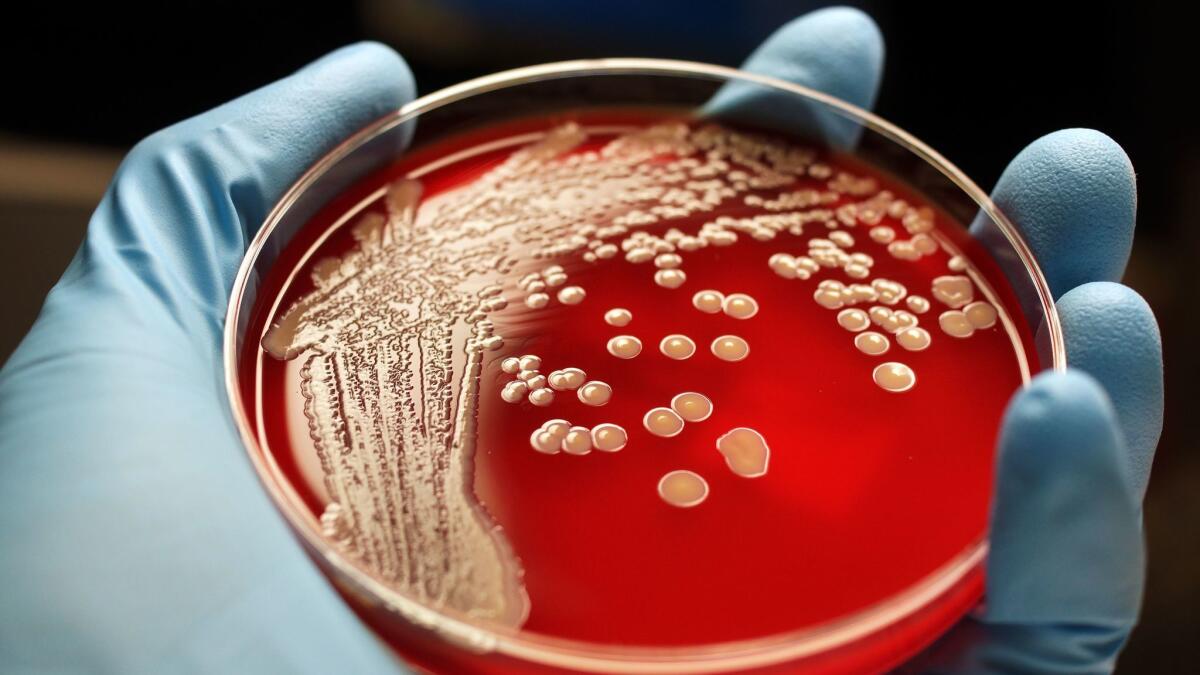Bacteria infected 10 infants at UC Irvine hospital, but the public is just finding out

Over the course of eight months, a lethal bacteria infected 10 already critically ill infants in UC Irvine Medical Centerâs neonatal intensive care unit â an outbreak that the public is only finding out about now.
None of the infants have died, hospital officials said.
Yet UCI doctors have not found the source of the infections â which continued even after 220 employees used antiseptic soap and ointment to eliminate bacteria on their skin and in their noses.
Orange County health officials have known about the continuing hospital-acquired infections since the middle of December, when lab tests confirmed that five infants had been infected by the same strain of a superbug.
That month, two more babies were sickened. Another tested positive in late February, and two more in March.
County officials said they did not notify the public about the outbreak because they had no evidence that infants being treated at UCIâs neonatal unit were at higher risk than infants admitted elsewhere.
UCI officials say they did not believe it was necessary to notify families preparing to have labor and deliveries at the hospital of the ongoing outbreak. They said they had isolated the infected patients in one of the hospitalâs two intensive care units for infants. New patients are now only accepted into the other unit, they said.
The 10 babies tested positive for methicillin-resistant Staphylococcus aureus, or MRSA. The superbug is especially dangerous for premature infants. One study found that 26% of infants infected with MRSA while in the ICU died.
The last positive test for MRSA in one of the newborns at UCI was on March 26, according to hospital officials. That baby has since tested negative and none of the infants have active infections, the hospital said.
Hospital officials confirmed the outbreak after questions from The Times. The newspaper learned of the outbreak from Marian Hollingsworth, who filed a complaint about it with the state.
Hollingsworth, who sits on a state advisory committee on hospital-acquired infections, said it appeared UCI and government health officials were trying to quietly handle the outbreak internally.
She learned of the outbreak, she said, from a friend who works in the UCI hospital complex.
Hollingsworth said she believes the hospital should have informed pregnant women being admitted to deliver their infants.
âYou never know if your baby will end up in the NICU,â Hollingswroth said, using the shorthand term for the neonatal intensive care unit. âI would have wanted to know.â
UCI officials say they have worked aggressively to try to prevent more infections, using measures that âmeet or exceed best industry practices.â
âOur rapid response came the minute we saw the strains were the same,â said Susan Huang, UCIâs medical director of epidemiology and infection prevention.
Huang said that since last month, UCI has been disclosing the outbreak in a letter to parents of all infants in intensive care.
Before that time, she said, staff had been instructed to disclose the MRSA infections to parents as their babies were being tested or treated for the infections.
Huang said the hospital has not been testing patients in other areas of the medical center for the MRSA strain.
The UCI case is not an isolated one. For decades, hospitals have struggled to contain lethal pathogens from spreading in the intensive care units treating premature babies.
The fragile patients are especially vulnerable to infections because of their serious conditions, which often require catheters and ventilators to keep them alive. Their immune systems are still developing.
Besides being potentially deadly, the infections can harm the infantsâ brain development and growth in early childhood.
The outbreaks are also costly. A 2010 study found that a MRSA infection extended the infantâs hospital stay by 40 days on average at an additional cost of $160,000.
The federal Centers for Disease Control and Prevention does not track the number of outbreaks or deaths from infections in the neonatal units.
Lisa McGiffert, who directs the safe patient project at Consumers Union, said some outbreaks have been uncovered by media reports or when doctors write about them in medical journals. The public does not learn about an untold number of others, she said.
In January, New Jersey health officials confirmed that an outbreak of MRSA had occurred in a neonatal unit of a Camden hospital after a nurse detailed the infections in a lawsuit. The nurse said in her lawsuit that she had been fired for reporting the hospitalâs mishandling of the outbreak.
âA lot of these outbreaks disappear,â McGiffert said.
Experts say the outbreaks can be prevented by proper infection control procedures, including some that can be costly to the hospitalâs bottom line. For example, studies have found that infection rates decrease when more nurses are available to care for the infants or when the unit is moved to a larger space.
In 2013, the CDC said it had written guidelines for hospitals in preventing outbreaks in the neonatal units. The agency said then it was preparing to publish the proposed guidelines in the Federal Register. But that did not happen.
The agency restarted the project last year and is now working on a new proposed guideline.
Martha Sharan, a CDC spokeswoman, said Thursday the proposed guidelines were not published in 2013 so that the agency could âcarefully evaluate new and relevant scientific articlesâ on the subject.
In California, state officials who license hospitals are expected to quickly respond to complaints when patients may be in danger.
A state inspector did not visit the UCI Medical Center to investigate the outbreak until March 20, after Hollingsworthâs complaint.
UCI said it had sent a letter to the state describing the infantsâ infections in early January.
By then, seven of the 10 infants had been sickened.
In a letter to Hollingsworth, state officials said that their investigation completed on April 3 found that the hospital had not broken any federal or state laws.
Hollingsworth questioned that finding. âIf UCI had done everything correctly,â she said, âthere would not have been so many babies infected.â
State officials said Thursday that they never received UCIâs letter and that the hospital did not call to follow up.
John Murray, a UCI spokesman, said four employees also tested positive for being colonized with the same strain of MRSA in January. After the use of the antiseptic soap, those employees have now tested negative, he said.
The hospital is continuing to clean all equipment and surfaces throughout the unit, he said. Staff and family members must also wear gowns and gloves while visiting the babies and take other precautions such as placing cellphones in plastic bags.
âOur goal is to ensure the safety of our patients and eradicate the presence of any drug-resistant bacteria in our neonatal intensive care unit,â Murray said.
McGiffert at Consumers Union said the group believes that all outbreaks should be made public so patients can take precautions. The public disclosure would also cause hospitals to work harder to prevent infections, she said.
âPatients have a right to know,â she said.
Follow @melodypetersen on Twitter
More to Read
Inside the business of entertainment
The Wide Shot brings you news, analysis and insights on everything from streaming wars to production â and what it all means for the future.
You may occasionally receive promotional content from the Los Angeles Times.











